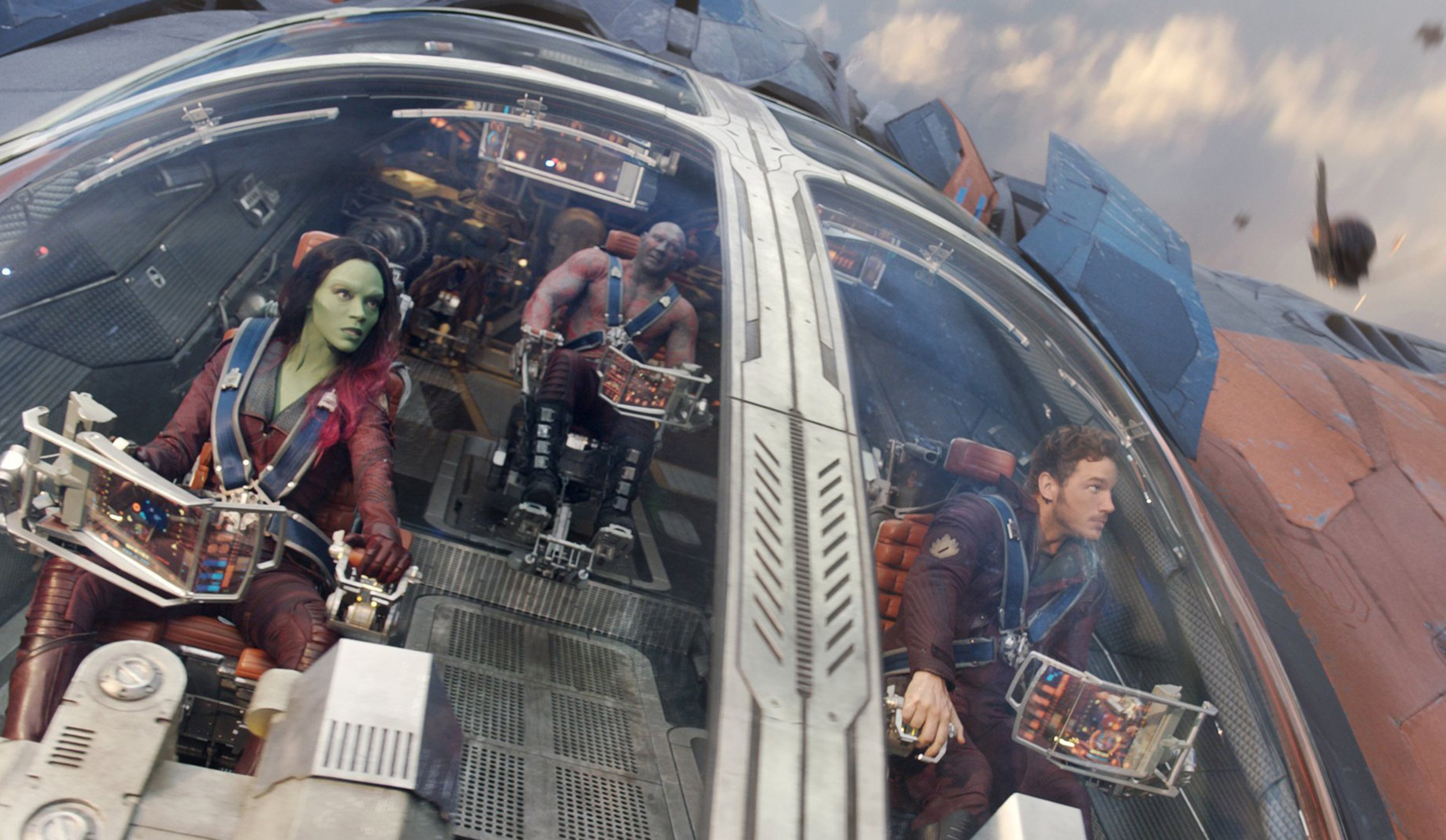

By Gina McIntyre
Los Angeles Times (TNS)
Early in the making of Marvel’s “Guardians of the Galaxy,” visual effects supervisor Stephane Ceretti invited a raccoon named Oreo to spend a few hours in his London office.
He was looking for inspiration for one of the movie’s central characters, the mouthy wiseguy Rocket Raccoon, and the natural world seemed like a productive starting place.
“They touch everything. They’re very tactile animals,” Ceretti recalled in a phone interview last week. “We spent a lot of time filming the way he moved so the animators could reference that.
“Even though it’s a raccoon that can walk and talk, we just want to make him look as present in the image as possible so people don’t question it.”
Ceretti’s intensive study sessions paid off.
“Guardians” is one of five films vying for the Oscar for outstanding visual effects at Sunday’s 87th Academy Awards, a contender in a strong field that includes another Marvel outing, “Captain America: The Winter Soldier,” as well as “X-Men: Days of Future Past,” “Dawn of the Planet of the Apes” and “Interstellar” — or, respectively, the second, fourth, ninth, 11th and 16th highest-grossing movies of 2014.
While each is long on visual scope and impressive digital artistry, “Guardians” might rank as the only contender to liberally pepper its alien landscapes and expansive star fields with goofy, euphoric comedy.
It could easily be considered this year’s most offbeat double-Oscar nominee (it also was nominated in the makeup and hairstyling category).
Adapted from a relatively obscure 2008 comic book series, the outre space opera brings together a petty outlaw who calls himself Star-Lord (Chris Pratt) with a green assassin, a literal-minded brute and a pair of truly unusual animals — Rocket Raccoon and his pal Groot, a sweet-natured sentient tree — to stop a cosmic villain.
Rocket is voiced by Bradley Cooper, a lead actor nominee for his role as Chris Kyle in “American Sniper” and Groot by action star Vin Diesel.
The camaraderie between the duo helped win over moviegoers and critics; the $170-million production took in nearly $775 million at the worldwide box office, earning a 91 percent fresh rating on the website Rotten Tomatoes and spawning a planned sequel due to arrive in 2017.
Ceretti, who shares his nomination with “Guardians” FX collaborators Nicolas Aithadi, Jonathan Fawkner and Paul Corbould, said that even before filming began, director James Gunn repeatedly emphasized the pivotal importance of the two CG characters.
“James was afraid that having a raccoon and a tree in the middle of other human people would be a little bit odd,” Ceretti noted. “He kept saying, ‘I really don’t want them to look like Bugs Bunny in the middle of the Avengers. I want them to look real, I want them to feel real.'”
Starting with early concept designs, Ceretti and his team (roughly 200 animators worked on the character) studied Oreo and other raccoons to help gain a better understanding of how the animals move and behave in nature.
They then made strategic alterations to bring Rocket to life.
In the film, the creature is a product of genetic testing that leaves him with unresolved anger issues, a wicked sense of humor and a fondness for automatic weapons, and his screen posture needed to reflect those characteristics, said Ceretti, a native of France and a first-time Oscar nominee whose previous credits include “Batman Begins,” “X-Men: First Class” and the time-traveling literary adaptation “Cloud Atlas.”
“He needs to be funny at times, he needs to be annoying, he needs to make us cry sometimes,” he said. “We had to change a little bit the way the raccoons are built in terms of in their legs and the size of their shoulders. Raccoons don’t have shoulders. We had to create a character with a bit of shoulders so he could emote, so we could get some nice poses out of that.”
After digitally building the character’s skeleton, the technicians layered on his musculature and skin, then his fur and finally his wardrobe.
To help provide additional nuance and texture, “Guardians” costume designer Alexandra Bryne produced actual garments for Rocket, which were scanned into the computer.
Accurately creating fur remains a challenge.
“It takes quite a lot of time to render, especially with the level of detail we wanted for Rocket,” Ceretti said. “Raccoons have different colors along each hair, and there are moments in the film when he’s wet, and that’s another level of complication.”
Gunn’s actor brother, Sean, performed as Rocket on the “Guardians” set — the movie was filmed in England in 2013 — shooting most of his scenes seated to approximate Rocket’s rather diminutive stature. (A mime was hired to stand in for Groot, Ceretti said.)
Having an actor physically present for the scenes helped the other cast members deliver sharper performances, Ceretti said — rather than staring at, for example, a tennis ball on a stick holding the place in the frame where Rocket would be inserted digitally in post-production, they could actually look at, and interact with, a person.
“I think the fact that we didn’t have any technology getting in the way made it more fluid in terms of the acting,” Ceretti said.
“We had lots of funny moments, comedic moments, and we felt it was good not to get too much technology into that and let it flow as much as possible. We tried to help the process by not being too invasive in a way.”
Cooper’s performance as Rocket became the final component.
The actor was filmed during his voice recording sessions so that the animators could incorporate his facial expressions and body language into Rocket’s movements.
“We told him, ‘Just act as if you were there,’” Ceretti said.





